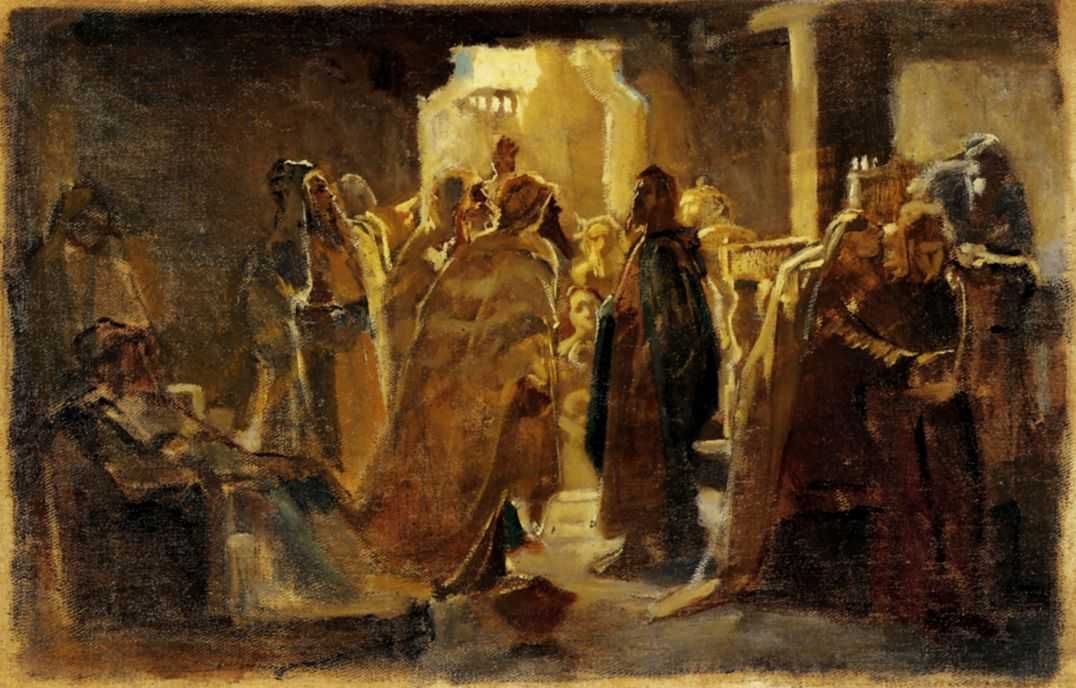“‘It is too small a thing that You should be My Servant
to raise up the tribes of Jacob, and to restore the preserved ones of Israel;
I will also give You as a light to the Gentiles,
that You should be My salvation to the ends of the earth.’”
(Isaiah 49:6.)
“Now it shall come to pass in the latter days
that the mountain of the LORD’S house
shall be established on the top of the mountains,
and shall be exalted above the hills;
and peoples shall flow to it.
Many nations shall come and say,
‘Come, and let us go up to the mountain of the LORD,
to the house of the God of Jacob;
He will teach us His ways,
and we shall walk in His paths.’
For out of Zion the law shall go forth,
and the word of the LORD from Jerusalem.
He shall judge between many peoples,
and rebuke strong nations afar off;
they shall beat their swords into plowshares,
and their spears into pruning hooks;
nation shall not lift up sword against nation,
neither shall they learn war anymore.” (Micah 4:1-3.)
“Now it shall come to pass in the latter days
that the mountain of the LORD’S house
shall be established on the top of the mountains,
and shall be exalted above the hills;
and all nations shall flow to it.
Many people shall come and say,
‘Come, and let us go up to the mountain of the LORD,
to the house of the God of Jacob;
He will teach us His ways,
and we shall walk in His paths.’ For out of Zion shall go forth the law,
and the word of the LORD from Jerusalem.
He shall judge between the nations,
and rebuke many people;
They shall beat their swords into plowshares,
and their spears into pruning hooks;
nation shall not lift up sword against nation,
neither shall they learn war anymore.” (Isaiah 2:2-4).
“All nations whom You have made
shall come and worship before You, O Lord,
and shall glorify Your name.” (Psalm 86:9).
“All the ends of the world
shall remember and turn to the LORD,
and all the families of the nations
shall worship before You.
For the kingdom is the LORD’S,
and He rules over the nations.” (Psalm 22:27-28).
“‘On that day I will raise up
The tabernacle of David, which has fallen down,
and repair its damages;
I will raise up its ruins,
and rebuild it as in the days of old;
that they may possess the remnant of Edom,
and all the Gentiles who are called by My name,’
says the LORD who does this thing.” (Amos 9:11-12).
“I will declare the decree: the LORD hath said unto me, Thou art my Son; this day have I begotten thee. Ask of me, and I shall give thee the heathen for thine inheritance, and the uttermost parts of the earth for thy possession.” (Psalm 2:7-8)
“I saw in the night visions, and, behold, one like the Son of man came with the clouds of heaven, and came to the Ancient of days, and they brought him near before him. And there was given him dominion, and glory, and a kingdom, that all people, nations, and languages, should serve him: his dominion is an everlasting dominion, which shall not pass away, and his kingdom that which shall not be destroyed.” (Daniel 7:13-14)
“And in that day there shall be a root of Jesse, which shall stand for an ensign of the people; to it shall the Gentiles seek: and his rest shall be glorious.” (Isaiah 11:10)
“The Gentiles shall come to your light,
and kings to the brightness of your rising.” (Isaiah 60:3).
“For then I will restore to the peoples a pure language,
that they all may call on the name of the LORD,
to serve Him with one accord.
From beyond the rivers of Ethiopia
My worshipers,
the daughter of My dispersed ones,
shall bring My offering.” (Zephaniah 3:9-10).
“‘Sing and rejoice, O daughter of Zion! For behold, I am coming and I will dwell in your midst,’
says the LORD. ‘Many nations shall be joined to the LORD in that day, and they shall become My people. And I will dwell in your midst.’
Then you will know that the LORD of hosts has sent Me to you.’” (Zechariah 2:10-11).
“O LORD, my strength and my fortress,
My refuge in the day of affliction,
the Gentiles shall come to You
from the ends of the earth and say,
‘Surely our fathers have inherited lies,
Worthlessness and unprofitable things.’” (Jeremiah 16:19).
“Thus says the LORD of hosts:
‘Peoples shall yet come,
inhabitants of many cities;
The inhabitants of one city shall go to another, saying,
“Let us continue to go and pray before the LORD,
and seek the LORD of hosts.
I myself will go also.”
Yes, many peoples and strong nations
shall come to seek the LORD of hosts in Jerusalem,
and to pray before the LORD.’
“Thus says the LORD of hosts: ‘In those days ten men from every language of the nations shall grasp the sleeve of a Jewish man, saying, “Let us go with you, for we have heard that God is with you.”’” (Zechariah 8:20-23).
“‘For from the rising of the sun, even to its going down,
My name shall be great among the Gentiles;
in every place incense shall be offered to My name,
and a pure offering;
for My name shall be great among the nations,’
says the LORD of hosts.”
(Malachi 1:11).


